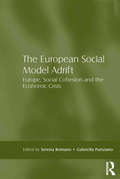- Table View
- List View
The Ethics of Doping and Anti-Doping: Redeeming the Soul of Sport? (Ethics and Sport)
by Verner MøllerWith every positive drugs test the credibility and veracity of modern elite sport is diminished. In this radical and provocative critique of current anti-doping policy and practice, Verner Møller argues that the fight against doping – promoted as an initiative to cleanse sport of cheats – is at heart nothing less than a battle to save sport from itself, located on the fault-line between the will to purity and the will to win. Drawing on extensive and detailed case studies of doping in sport, and using a highly original blend of conceptual ideas from philosophy and sociology, Møller strongly criticises current anti-doping regimes and challenges our commonly held ideas about the nature of sport and the risks posed by drugs to health and fair play. He argues forcefully that we must understand the precarious position of the athlete and that only by containing coaches, doctors and drug companies within the anti-doping regime can we hope to ever make progress on this most important issue. Written in a lively and engaging style, and skilfully blending empirical case studies with cutting edge theory, this book represents an important statement on the nature of sport, morality and modernity. It is important reading for all serious students and scholars of the ethics, sociology and politics of sport.
The Ethics of Governance: Moral Limits of Policy Decisions
by Keya Maitra Shashi Motilal Prakriti PrajapatiThe Ethics of Governance: Moral Limits of Policy Decisions offers a toolbox drawn from normative ethics which finds applications in public governance, primarily focusing on policy making and executive action. It includes ethical concepts and principles culled from different philosophical traditions, ranging from more familiar Western theories to non-Western ethical perspectives, thereby providing a truly global, decolonized and expanded normative lens on issues of governance. The book takes a unique and original approach; it demonstrates the use of the ethical toolbox in the context of actual examples of governance challenges.Taking three major case studies each representing an aspect of human-human and/or human-nature and/or human-animal relationship, the book attempts to show the significance of public practical reasoning in policy decisions with the aim of arriving at reasonable responses. Acknowledging the challenges that policy makers often face, the book highlights the fact that policy making is hardly an exercise yielding a black-or-white solution; rather it involves finding the most reasonable normative outcome (course of action) in a given situation, especially employing an expanded understanding of values including well-being, sustainability, interdependence and community. This effort that helps bridge the gap between ethical theorists and policy practitioners exemplifies the necessary role of ‘engaged philosophy’ in public governance.In the major case studies, Boxes offer facts and figures along with pertinent ethical questions that have been raised and discussed. Aiming to aid the engagement of a diverse audience including non-philosophy readers, each chapter also includes Boxes containing examples, shorter case studies, at-a-glance charts, and tables with comprehensive ethical tools for a quick recap.
The Ethics of Humour in Online Slavic Media Communication
by Duskaeva LiliaThe Ethics of Humour in Online Slavic Media Communication is devoted to research on how the rules of humour used online media are changing and how these changes rearrange the traditions of speech interaction in media communication. The authors of the book are experienced researchers in the field of Slavic media linguistics and represent five neighbouring countries: Russia, Belarus, Lithuania, Slovakia, and Poland. The research in the volume is based on the data from Slavic languages. The diversity and, at the same time, relative proximity of Slavic languages makes it possible to put separate studies into a wider comparative context, in order to reveal the general and ethno-cultural patterns in using means of communicative etiquette; it helps define the ethno-cultural factors behind the formation of such means. Speech practice of humour creation shows the creative potential of all languages, including the ones with a small number of speakers – Slovak and Belarusian, which have the status of state languages, but are strongly influenced by international languages (English and Russian). This volume is a valuable resource for researchers in the field of Slavic studies.
The Ethics of Memory in a Digital Age
by Alessia Ghezzi Ângela Guimarães Pereira Lucia Vesnić-AlujevićThis edited volume documents the current reflections on the 'Right to be Forgotten' and the interplay between the value of memory and citizen rights about memory. It provides a comprehensive analysis of problems associated with persistence of memory, the definition of identities (legal and social) and the issues arising for data management.
The Ethics of Research with Human Subjects: Protecting People, Advancing Science, Promoting Trust (The International Library of Bioethics #111)
by David B. ResnikIn The Ethics of Research with Human Subjects, David B. Resnik, PhD/JD, develops and defends an approach to thinking about ethical and policy dilemmas in research with human subjects based on the notion of trust. The book explains why trust is important not only between investigators and research subjects but also between and among other stakeholders involved in the research enterprise, including research staff, sponsors, institutions, communities, oversight committees, government agencies, and the public. Dr. Resnik argues that trust should be viewed as a distinct ethical principle for research with human subjects that complements other principles, such as respect for human dignity, beneficence, non-maleficence, and justice. The book applies the principle of trust to numerous issues, including informed consent, confidentiality/privacy, risk minimization, risk/benefit assessment, payments for participation, protection of vulnerable subjects, experimental design, research integrity, and research oversight. The book also includes discussions of the history of research involving human subjects, moral theories and principles, contemporary cases, and proposed regulatory reforms. This second edition of The Ethics of Research with Human Subjects expands upon and clarifies arguments and ideas discussed in the first edition and includes new material on emerging issues in human research ethics, including community-based research, citizen science research, challenge studies (including COVID-19 experiments), public health research, genomics research, social and behavioral research, xenotransplantation experiments, alternative study designs, and research with people with compromised decisional capacity, employees, and students. The book is of interest to undergraduate and graduate students who are studying ethical and policy issues related to research with human subjects, as well as scientists and scholars who are interested learning more about the issues and thinking about what it means to promote integrity and trust in research with human subjects.
The Ethics of Sports Coaching (Ethics and Sport)
by Alun R. HardmanIs the role of the sports coach simply to improve sporting performance? What are the key ethical issues in sports coaching practice? Despite the increasing sophistication of our understanding of the player-sport-coach relationship, the dominant perspective of the sports coach is still an instrumental one, focused almost exclusively on performance, achievement and competitive success. In this ground-breaking new book, leading sport scholars challenge that view, arguing that the coaching process is an inherently moral one with an inescapably ethical dimension, involving intense relationships between players and coaches. The Ethics of Sports Coaching critically examines this moral aspect, develops a powerful idea of what sports coaching ought to be, and argues strongly that coaches must be aware of the ethical implications of their acts. The book is structured around four central themes: the nature of coaching, the character of the coach, coaching specific populations and specific coaching contexts. It explores in detail many of the key ethical issues in contemporary sports coaching, including: coaching special populations the ethics of talent identification understanding the limits of performance enhancement coaching dangerous sports expatriate coaching setting professional standards in sports coaching. Combining powerful theoretical positions with clear insights into the everyday realities of sports coaching practice, this is an agenda-setting book. It is essential reading for all students, researchers and practitioners with an interest in sports coaching or the ethics and philosophy of sport.
The Ethics of Witness: Dailiness and History in Hou Hsiao-hsien’s Films
by Xiao CaiThis book explores the aesthetic and ethical ways in which history and daily life are filmically represented and witnessed in Taiwanese director Hou Hsiao-hsien’s movies. From the era of the Japanese Occupation to the White Horror and then to the lifting of martial law, the author shows how Hou Hsiao-hsien uses visual media to evoke the rhythms of daily life through the emotional memory of the characters and communities he explores. In particular, the book focuses on the ways in which Hou Hsiao-hsien seeks to reflect the strong dilemmas of identity and the traumatic emotions associated with witnessing history. Taking an interdisciplinary approach, it investigates the concepts of daily life, representation and historical trauma in order to focus on how these films represent history and political trauma through the nature of daily life and personal memories, and the resulting historical responsibility and ethics. This is the first academic monography about Hou Hsiao-hsien’s films.
The Ethnobotany of Pre-Columbian Peru
by Margaret TowleAll of man's life is in some way associated with the plant world, from his food and shelter to his art, religion and language. The study of this all-pervading relationship between man and the plant world is called ethnobotany. This book provides a systematic reconstruction of the ethnobotany of one of the hearths of American civilization, in the prehistoric cultures of the Peruvian Central Andes.As we learn more about the rise and spread of New World agriculture, it becomes evident that Peru was one of the sources of its development. Plants were cultivated here at least 2,000 years before the beginning of the Christian era. Village life was intimately bound up with this cultivation, later civilizations rested upon it as a foundation, and from Peru agriculture was diffused to other parts of the Americas.Towle bases her work on the evidence of plant remains found in archeological sites, surveys of botanical and ethnological literature, and field studies of modern plant utilization. After a methodological and historical introduction, she proceeds to a systematic listing of plant species, each fully described. She then presents the ethnobotanical data for each of the cultural-geographic divisions of the area, giving a chronological picture of the use of wild and cultivated plants against a background of the cultures of which they were part. A summary of the evolutionary trends in the region as a whole is followed by a full bibliography and index. The book contains fifteen pages of plates.Margaret A. Towle (1902-1985) received her doctorate from Columbia University in 1958 and was research fellow in ethnobotany in the Botanical Museum of Harvard University.
The Ethnographic Imagination: Textual Constructions of Reality (Routledge Revivals)
by Paul AtkinsonFirst published in 1990, The Ethnographic Imagination explores how sociologists use literary and rhetorical conventions to convey their findings and arguments, and to 'persuade' their colleagues and students of the authenticity of their accounts. Looking at selected sociological texts in the light of contemporary social theory, the author analyses how their arguments are constructed and illustrated, and gives many new insights into the literary convention of realism and factual accounts.
The Ethnographic Moment
by Robert RedfieldThe first fifty years of the twentieth century were a time of ferment in American anthropology. American ethnographic work evolved from the "salvage" work of professionals affiliated with museums who undertook to document with artifacts and testimony the threatened traditional way of life among the Native American tribes, to the establishment of anthropology as a science, represented in university departments, that sought to describe the "ethnographic present" of isolated primitive peoples, often in distant parts of the world.By the beginning of the 1950s, cultural anthropology discovered the peasant. Robert Redfield, himself a leading figure in this paradigm shift, challenged anthropology's focus on a static model of the isolated primitive community, pointing out the dynamic nature of the "little communities" he studied in Mesoamerica. These were not isolated communities, but rather local, traditional cultures located well within the sphere of a complex urban culture. In order to distinguish the "great tradition" deriving from urban centers from the "little tradition" of a more primitive culture, Redfield believed anthropology needed to refer to other disciplines, such as theology, philosophy, economics, and sociology. In other words, anthropology had to develop from the collection of material artifacts to a concern with the immaterial realm of values and ideas.This collection of essays and previously unpublished papers, The Ethnographic Moment, tells the story of a remarkable chapter in Redfield's pioneering efforts on what was then an anthropological frontier. The present volume covers the years from 1952 to 1958, the last of Redfield's life. It focuses solely on his study of peasant communities. At the core of the book is his correspondence with the philosopher-humanist F. G. Friedmann, who played an important role in Redfield's conceptualization of the complex urban-rural continuum that characterizes the peasant's world. The volume also includes an autobiographical introduction by Friedmann that illuminates both his own writings and the humanistic background that motivated his study of peasantry.
The Ethnographic Radiographer
by Ruth M. StrudwickWritten from the perspective of a diagnostic radiography educator, this book introduces readers to ethnography as a methodology and examines how an ethnographic researcher sees the world in which they live.
The Ethnomethodologists (Routledge Revivals)
by Bob Anderson W.W. SharrockOriginally published in 1986, this work examines how key figures such as Garfinkel, Sacks and Cicourel have revolutionised thinking about how sociology's presuppositions about 'being social' are grounded. Yet until the appearance of this book there were no clear and authoritative introductions to the main thinkers in the field or their work. In assessing the critical reception of Ethnomethodology, Sharrock and Anderson argue persuasively that much is wide of the mark - as they say, the real argument has yet to begin.
The Ethos of the Enlightenment and the Discontents of Modernity (Routledge Advances in Sociology)
by Matan OramThis book probes the sources and nature of the ‘discontents of modernity’. It proposes a new approach to the philosophic-critical discourse on modernity. The Enlightenment is widely understood to be the foundational moment of modernity. Yet despite its appeal to reason as the ultimate ground of its authority and legitimacy, the Enlightenment has had multiple historical manifestations and, therefore, can hardly be said to be a homogenous phenomenon. The present work seeks to identify a unitive element that allows us to speak of the Enlightenment. To do so, it enjoins the concept of ‘ethos’ and its relation to the ‘discontents of modernity’. This book proposes a new theoretical framework for the examination of the interrelationships between ‘critical thought’ and ‘modernity’, based on a fundamental distinction between criticism and negation. It will appeal to scholars and students of critical theory, the history of ideas, philosophy, the sociology of knowledge, and political science.
The European City: A Western Perspective
by G. J. Ashworth D. Burtenshaw M. BatemanOriginally published in 1991, this book focusses on the philosophies, histories and processes which have made the West European city system rich in internal variety yet distinct from that of the rest of western industrialised urban society. It synthesizes international experiences in particular aspects of urban policy making, with reference to Germany, France and Benelux. The book covers urban planning in its broadest sense – from economic, socio-spacial, recreational, housing and transport perspectives.
The European Constitution, Welfare States and Democracy: The Four Freedoms vs National Administrative Discretion (Routledge Research in EU Law)
by Christoffer C. EriksenThis book explores how the right to the free movement of goods, persons, services and capital in the European Union legal order affects welfare states. These "four freedoms", as they are known, are vital instruments for the protection of a European market unencumbered by internal frontiers. The European Constitution, Welfare States and Democracy explore the relationships and conflicts that have emerged between the European constitution and the legal regulation of mixed economies and markets within welfare-states. In particular, it examines the threat posed to the discretionary powers enjoyed by national governments and administrative authorities. Christoffer C. Eriksen has undertaken a comprehensive analysis of a series of judgments in which the European Court of Justice has clearly indicated the ways in which the four freedoms may be incompatible with the current practice of entrusting national administrative authorities with discretionary powers and thus highlights how the four freedoms are provoking democratic dilemmas, previously neglected in the academic literature. The book is written in a style which communicates beyond an audience of specialized legal scholars and although it includes analysis of black letter law, its methodology also draws from the disciplines of philosophy, political science, and sociology.
The European Football Championship: Mega-Event and Vanity Fair (Football Research in an Enlarged Europe)
by Basak Alpan Alexandra Schwell Albrecht SonntagThe UEFA European football championship was the first European mega-event to take place in post-socialist Europe. Taking this as a departure point, this volume focuses on football as a realm of constructing and negotiating identities using rich ethnographic fieldwork and in-depth media analysis.
The European Handbook of Media Accountability (Routledge International Handbooks)
by Matthias Karmasin Tobias Eberwein Susanne FenglerIn recent years, the Leveson Inquiry in Great Britain, as well as the EU High-Level Group on Media Freedom and Pluralism, have stirred heated debates about media accountability and media self-regulation across Europe. How responsible are journalists? How well-developed are infrastructures of media self-regulation in the different European countries? How much commitment to media accountability is there in the media industry – and how actively do media users become involved in the process of media criticism via social media? With contributions from leading scholars in the field of journalism and mass communication, this handbook brings together reports on the status quo of media accountability in all EU members states as well as key countries close to Europe, such as Turkey and Israel. Each chapter provides an up-to-date overview of media accountability structures as well as a synopsis of relevant research, exploring the role of media accountability instruments in each national setting, including both media self-regulation (such as codes of ethics, press councils, ombudspersons) and new instruments that involve audiences and stakeholder groups (such as media blogs and user comment systems). A theoretically informed, cross-national comparative analysis of the state of media accountability in contemporary Europe, this handbook constitutes an invaluable basis for further research and policy-making and will appeal to students and scholars of media studies and journalism, as well as policy-makers and practitioners.
The European Heritage
by Gerard DelantyGerard Delanty offers a critical interpretation of the European heritage today in light of recent developments in the human and social sciences, and in view of a mood of crisis in Europe that compels us to re-think the European past. One of the main insights informing this book is that a transnational and global perspective on European history can reorient the European heritage in a direction that offers a more viable way for contemporary Europe to articulate an intercultural identity in keeping with the emerging shape of Europe, and with its own often acknowledged past. He argues that the European heritage is based less on a universalistic conception of culture than on a plurality of interconnecting narratives, and the inclusion of new voices and is being forged in new spaces of critical dialogue. Such a perspective opens up new directions for scholarship and public debate on heritage that are guided by critical cosmopolitan considerations that highlight contention, resistances, competition and dissonance. He argues that the specificity of the European dimension of culture is in the entanglement of many cultures rather than in an original culture. The cultures of Europe are not separated but have been shaped in close interaction with each other and with the non-European world. Nations are not therefore unique, exceptional or fundamentally different from each other. The outcome of such intermingling is a multiplicity of ideas of Europe that serve as shared cultural reference points.
The European Ideological Space in Voters' Own Words (Elements in European Politics)
by Noam Gidron Thomas TichelbaeckerThere is a broad consensus that the ideological space of Western democracies consists of two distinct dimensions: one economic and the other cultural. In this Element, the authors explore how ordinary citizens make sense of these two dimensions. Analyzing novel survey data collected across ten Western democracies, they employ text analysis techniques to investigate responses to open-ended questions. They examine variations in how people interpret these two ideological dimensions along three levels of analysis: across countries, based on demographic features, and along the left-right divide. Their results suggest that there are multiple two-dimensional spaces: that is, different groups ascribe different meanings to what the economic and cultural political divides stand for. They also find that the two dimensions are closely intertwined in people's minds. Their findings make theoretical contributions to the study of electoral politics and political ideology.
The European Model of Sport: Myth or Reality? (Routledge Research in Sport Business and Management)
by Borja García Vanja SmokvinaThis is the first book to present a critical analysis of the concept of the European Model of Sport (EMS). The EMS concept is widely used by policymakers at the national and EU levels, and by some sports organisations, yet it has never been comprehensively defined in official documents. This book asks whether the EMS is real or imagined, evaluates its significance in a rapidly evolving European context and for world sport more broadly, and compares it against other models of sport in different regions of the world. The first section of the book is a multi-disciplinary analysis of the EMS, putting the EMS in historical context and examining the concept from political, economic, socio-cultural and legal perspectives. The second section of this book looks at different models of sport within Europe, including Germany, the UK, Scandinavia and South-East Europe, and how they intersect with EU policy. The final section of this book looks at models of sport in North America, Latin America, China, Africa and the Arab World, highlighting key differences and similarities in order to illuminate our understanding of sport governance, policy and management around the world. Throughout, this book includes consideration of grassroots sport, going beyond traditional analyses that have focused primarily on professional sport. In an era in which sport represents a dynamic arena for competition between corporations, NGOs, international organisations and nation-states, this book is an essential reference for anybody with an interest in sport policy, sport governance, sport management, sport law, EU policy and law, the history of European integration or the relationship between sport and wider society.
The European Parliament Election of 2019 in East-Central Europe: Second-Order Euroscepticism
by Vít Hloušek Petr KaniokThis book provides an analysis of the European Parliament elections 2019 with a focus on East-Central European countries. The authors offer conceptual insights into Euroscepticism and discuss traditionally familiar concepts in a new light, pairing East-Central European Euroscepticism with visions of illiberal democracy, on the one hand, and showing the increasing Europeanisation of Eurosceptic parties in the region, on the other. The book combines a fresh and innovative conceptual treatment with rich and accurate empirical evidence in order to highlight the dynamics of Euroscepticism in "new" EU member states. Students and experts interested in EU politics, within academia and beyond, will find this volume particularly informative.
The European Parliament in the News: A Critical Analysis of the Coverage in the United Kingdom and Greece (Contributions to Political Science)
by Dimitrios SouliotisThis book analyzes the social legitimacy deficit of the European Parliament (EP) in the United Kingdom and Greece. It does so by considering it, partially, a communication deficit, and by addressing the relevant inadequacies of its communication and media relations performance. Following this approach, the book identifies and critically analyzes the problems that the European Parliament is facing in communicating and portraying itself to news websites in the United Kingdom and Greece, and offers potential solutions to the issues presented.The book provides an initial comparison of the scale of the problems that the EP is facing in its communication and media relations performance in Greece and in the United Kingdom, focusing on a number of prominent, carefully selected, impartial or pro-European websites. The failures of the EP to secure adequate levels of visibility on these websites automatically signify serious basic weaknesses in its communication strategy. This book identifies those weaknesses, their causes, and presents solutions on how to solve them. Therefore, this book is a must-read for students and scholars of political science and media communication, as well as policy-makers and practitioners interested in a better understanding of the European Parliament's social legitimacy and communication deficit.
The European Ritual: Football in the New Europe
by Anthony KingFootball constitutes a vivid public ritual in contemporary European culture through which emergent social solidarities and new economic networks have come into being. This fascinating and unique volume traces the transformation of European football from the 1950s to the present, focusing in particular on the dramatic changes that have occurred in the last decade and linking them to the wider process of European integration. The examination of football illuminates how the growing dominance of the free market has changed European society from an international order in which the nation-state was dominant to a more complex transnational regime in which cities and regions are becoming more prominent than in the past. The study is supported by detailed ethnographic accounts emerging from the author's fieldwork at Manchester United and interview data with some of the most important figures in European football at clubs including Juventus, Milan, Bayern Munich, Schalke and Barcelona. It also includes a highly topical examination of racism in European football.
The European Social Model Adrift: Europe, Social Cohesion and the Economic Crisis
by Serena Romano Gabriella PunzianoThis volume presents a new perspective for discussing the European social contract and its main challenges, bringing together single-nation and comparative studies from across Europe. Presenting both theoretical discussions and empirical case studies, it explores various aspects of social cohesion, including social protection, the labour market, social movements, healthcare, social inequalities and poverty. With particular attention to the effects of the international economic and financial crisis on social cohesion, particularly in the light of the implementation of so-called ’austerity measures’, authors engage with questions surrounding the possible fragmentation of the European model of social cohesion and the transformation of forms of social protection, asking whether social cohesion continues to represent - if it ever did - a common feature of European countries. Breaking new ground in understanding the future of Social Europe and its main dynamics of change, The European Social Model Adrift will appeal to scholars of sociology, social policy and politics, with interests in social cohesion, the effects of financial crisis and the European social model.
The European Union and the Council of Europe
by Marina KolbWith the increasing prominence of fundamental rights within the EU it increasingly interferes in the core competence of the Council of Europe. This book traces the EU and the Council of Europe relationship in the field of human rights marked by mutual interferences and overlap and explores which factors trigger cooperation or conflict between the two organizations. Investigating the cases of data protection, the fight against terrorism, challenging Roma discrimination, the Memorandum of Understanding and the Fundamental Rights Agency through the lens of an implementation literature and management studies-perspective, this book contends that the biggest threat to interorganizational cooperation is organizational self-interest, despite a shared policy outlook. The book furthers the agenda set by the literature in this field by providing a new theoretical framework and an in-depth empirical study of two main actors in the field of human rights protection in Europe from a political science perspective. "
























